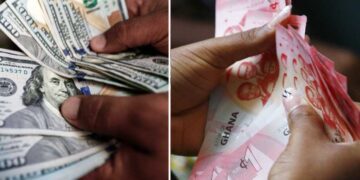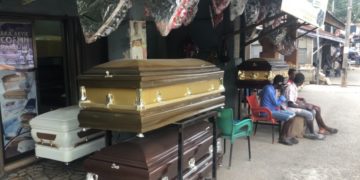[ad_1]
A pre-Codiv-19 survey by Afrobarometer, an online data analysis tool, found that one in five Africans faced a frequent lack of much-needed healthcare services.
Africa’s investment in health has repeatedly been called out but little has been done to boost financial investment. Now the chickens have come home to roost.
The number of those suffering from the Coronavirus is still low compared to what has been witnessed in the United States, Britain, Europe and even Asia. Africa was the last frontier in the incipient spread of the virus.
The first coronavirus case was reported on the continent on February 14 in Egypt.
On the 18th of March, the first case in Sub-Saharan Africa was reported in Nigeria.
The slow spread in the continent gave false hope that Africa and its people would be spared the worst of the pandemic. But when it started to spread, the reality sunk in fast. It exposed what we have always known for a long time. Most of Africa’s healthcare systems are not adequately equipped and their fragility is one outbreak away from a total nightmare.
Measures taken by countries
The initial response to the Covid 19 pandemic by individual countries in Africa was swift. Travel restrictions, total lockdowns and even curfews have been applied by different authorities.
Rwanda, for instance, announced an immediate lockdown, and has been supplying water and food to its vulnerable populations; South Africa announced a national lockdown and set in motion dozens of mobile testing units, with a combined daily testing capacity of 30,000. Nigeria has ex-tended its lockdown in Lagos and Abuja.
Kenya, on the other hand, instituted a nationwide dawn-to-dusk curfew, while limiting movement within its capital city and the environments to insulate the rest of the country.
Another plus is that the vast majority of Africa’s population lives in rural areas, which means less crowding and limited social interactions.
The other strength is that some African countries have some experience combating communicable diseases like Tuberculosis, HIV, Ebola, Rift Valley Fever, among others.
This implies the tenacity and the flexibility to battle yet another addition to the family of communicable diseases within its existing infrastructure.
The sage that you live, you learn seems to be working for Guinea, Sierra Leone and Liberia. These three West African countries bore the brunt of the Ebola outbreak between 2014–2016. Informed by their past experience, they have been implementing some of the lessons like testing at entry points and contact tracing.
This level of déjà vu worked for Nigeria and Senegal when Ebola spread in these countries. They had had the benefit of time to see what had worked in the neighboring countries.
They used the arsenal of lessons to halt the spread of Ebola through port of entry screening, fast and thorough tracing, monitoring of contacts, as well as rapid isolation.
The question to ask now is, would implementing Universal Healthcare have saved the continent from the troubles it is undergoing right now?
Universal Health Care (UHC) is founded on a simple but critical principle that everyone receives quality health services without reference to their financial capability.
The singular consideration for service is that one receives treatment if they need it, whether they can afford it or not. The Sustainable Development goal stipulates that by 2030, all regions will have universal health care.
We are ten years away from the set deadline and there is Coronavirus to remind us why having strong healthcare systems would have made this burden lighter.
According to Amref Health Africa CEO Dr Githinji Gitahi, ”Many countries have adopted the political declaration that was done at the UN general assembly in September and agreed and signed to it. The talk has happened but the walk has not happened”.
The fissures that exist in most of Africa’s healthcare infrastructure have come to bare in the midst of the coronavirus pandemic. It’s now a last-minute effort to equip systems that were already under resourced.
In a BBC Africa Facebook Live, the Head of Africa World Economic Forum, Elsie Kanza said “We have already seen the negative effects in terms of healthcare as countries scramble to get facilities up to scratch. They were weak beforehand and now governments have to operate under a crisis mode to close those gaps.”
Operating under pressure in the midst of a pandemic comes with its own added frustrations.
Africa’s Health Crisis
Africa shoulders one-third of the global disease burden and its health infrastructure is deficient by global measures, among them patient-doctor ratio.
With a population of more than 1.3 billion people, most of the countries have an average of two doctors per 10,000 people. Nigeria, Africa’s most populated country has a ratio of four doctors per 10,000 people, Kenya has two while the Democratic Republic of Congo has one according to WHO. The proposed WHO ratio is 1 doctor per 1,000 people.
Moreover, some of the continent’s healthcare systems have been propped up by donor funding. With the economic recession and contraction unfurling in Western Europe and North America, Africa will have to rely largely on its own resources in the future.
So far, there have been complaints about the quality of care for those in need of treatment, while healthcare workers lament they have not been adequately equipped to deal with a problem of COVID-19 magnitude.
Currently, there is apprehension that numbers of those infected will rise and the bed spaces, especially for those who require intensive care, might fall short.
The World Health Organisation estimates that there are less than 5,000 ICU beds available in 43 African countries. This translates to having 5 beds per one million people.
In some 41 countries, there are less than 2,000 ventilators available in public health facilities ac-cording to WHO data. These numbers are going to change dramatically once the efforts by different countries to increase capacity are completed. There is also the donation made by the Chinese billionaire Jack Ma that has not been factored.
Ventilators are crucial for those who need critical care.
Financing Universal Health Coverage
Generally, financing healthcare in Africa has been the proverbial elephant in the room.
At the African Union’s Heads of State summit in 2001, members pledged to allocate at least 15 per cent of their annual budgets to improving the health sector, in what’s popularly known as the Abuja Declaration. Few countries have kept their promise. They include Rwanda, Malawi, Mauritius and Seychelles.
Many others have fallen short, with some dedicating a meagre 5–7 per cent of their budgets to health.
The irony is that the Abuja declaration was just one of the many other conversations around making sure that healthcare gets the financial attention it deserves. As time has proven, member countries have perfected the art of breaking their own rules.
Nigeria, Africa’s economic giant which is also home to the continents largest population, is still struggling to shift the commitment from political talk to action.
Amref Health Africa CEO Dr Githinji Gitahi says ”They have made significant commitments but in actual terms, significant progress hasn’t been made. Some of the challenges in Nigeria are challenges you find in a devolved political environment where the state has to work very closely with the national government to realise some of these projects’’.
Where Nigeria has failed, Rwanda has been hailed for the progress to achieving Universal health care.
According to Dr Githinji, ”Rwanda has used a social health insurance approach which is based on mandatory social health insurance where the individuals who have the ability to earn contribute and the state contributes the balance and those who cannot anything contribute the state contributes everything.’’
The affordability and sustainability challenges experienced in Rwanda notwithstanding, it has made significant strides towards Universal Health Coverage.
Tanzania on its part has made significant progress on UHC. According to the Tanzania Medical Association president Dr Elisha Osati, “when you look at the health policy on provision of healthcare to all, Tanzania has the infrastructure in place. We have really tried in making sure we have the infrastructure.”
The sector is however grappling with financial challenges according to Dr Osati, ‘’This is partly because the budget allocation is not yet the proposed. Our economy is also not that strong so whatever is available has to be distributed to all the sectors. But on its part, the government has really tried to make progress.”
The other country that has been lauded for its progress in investing in UHC is Ghana. So much so that its health care system has been described as one of the most successful on the African continent. However, it is still struggling to find a sweet spot where financing healthcare is guaranteed.
”We have seen Ghana reach a significant number of people with financial protection but again they have been facing challenges of sustainability of their benefits package that they offered the public. I get a feeling that the commitment in West Africa especially Francophone Africa is more solid than their counterparts in East and Central Africa, ” he adds.
Dr. Lydia Dsane-Selby, Ghana’s Chief Executive of the National Health Insurance Authority says “Obviously a major policy like this will face challenges but these have been dealt with as we go along. We didn’t have a National ID card so we had to compile a database of members and we eventually had to go biometric to ensure we had a unique way of identifying members. Defining the benefit package whilst being financially sustainable has also been a challenge.’’
Ghana now has a membership of 12.5 million on the National Health insurance scheme which is about 42% of the population.
While the country is often referenced as one of the models of an insurance scheme that has worked for its people, Dr Dsane-Selby is quick to add, “There is no perfect healthcare system in the world. We are all striving to attain the best possible care for the resources we have. I am proud to be in a country that thought out of the box and came up with a health insurance scheme that is a hybrid of several of the best known insurance models but is uniquely applicable to Ghanaian circumstances. What we must remember is that you do not sit on your laurels. One must continually innovate to attain the best possible scenario.’’
In Senegal, the budget allocation to health is at 8 % which is still below the commitments of the Abuja declaration. Besides that, Senegal has a fairly strong healthcare infrastructure. Under its One Health approach, Senegal has exemplified good leadership in coordinating and monitoring health operations. In the UHC progress report of 2019, it was lauded for its ‘solid base in preventing, detecting and responding to public health threats’.
Kenya is piloting UHC in some 5 counties. President Uhuru Kenyatta wants Kenya to achieve Universal Health Coverage by 2022. The country however is grappling with the high burden of Non communicable diseases like cancer, diabetes and heart diseases.
With Covid -19 already complicating a bad situation, it will be interesting to see how Kenya navigates this time to make quality healthcare a priority.
Universal Health Coverage is not an entirely new idea in Uganda. It had started implementing some policies aimed at reducing the cost burden to the poor. For example, it abolished user fees for health services in public facilities from 2001. The program has been fraught with serious challenges. In some facilities, people are required to purchase their own medicine. In others, women going to deliver are expected to carry their own gloves. Uganda is struggling with a weak healthcare infrastructure, inequitable access to services as well as inadequate healthcare workers.
DRC on its part still needs to strengthen its health financing system. The current system locks people out because of the high out of pocket payments that those seeking healthcare need to make. Its high dependency on external funding to finance healthcare puts DRC in a disadvantaged position especially during this Covid -19 pandemic.
There are some lessons that countries can learn from the Ivory Coast. It had to abandon UHC in 2012 after a brief experiment. Some of the reasons why it was not viable then include poor management against rising costs as well as corruption. All of these came at a cost to the government which had to pay about US$60m in nine months.
Financing Africa’s healthcare remains a moving target, and with a new and aggressive contagion like COVID-19, reputed as the worst challenge for the world and the continent in history, Africa will have to dig to its deepest reservoirs of strength and resilience to live to tell its own story.
Anne Mawathe is the Health Editor for BBC Africa’s Life Clinic


















